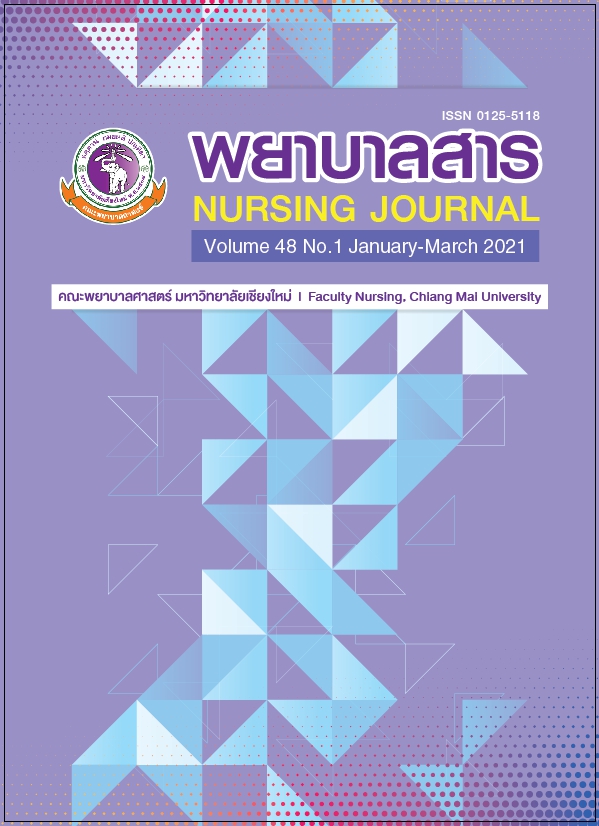Health Beliefs and Health Behaviors Among Persons with Systemic Lupus Erythematosus
Keywords:
Health beliefs, Health behaviors, Persons, Systemic Lupus ErythematosusAbstract
Systemic Lupus Erythematosus (SLE) is a chronic incurable disease. Appropriate health behaviors can constrain exacerbations and decrease complications in SLE. Health beliefs are factors that promote appropriate health behaviors. The purpose of this correlational descriptive study was to examine health beliefs, health behaviors, and relationships between the health beliefs and health behaviors among persons with SLE. The participants were SLE patients receiving treatment at an outpatient clinic, Lampang Hospital between December 2017 and March 2018. Eighty-five participants were recruited by criterion purposive sampling. The study instruments consisted of: 1) Personal Information Questionnaire, 2) the SLE Health Behaviors Questionnaire, 3) the Perceived Susceptibility to relapse and complications from SLE Questionnaire, 4) the Perceived Severity to relapse and complications from SLE Questionnaire, 5) the Perceived Benefits of Health Behavior Questionnaire, and 6) the Perceived Barriers of Health Behavior Questionnaire. All instruments were developed by the researcher. The content validity was confirmed by a panel of experts in the field and reliability was tested prior to collecting data. Data were analyzed using descriptive statistics and Spearman’s Rank Correlation.
The results revealed that
- The participants had a high level of health beliefs in aspect of the perceived susceptibility to relapse and complications from SLE, the perceived severity to relapse and complications from SLE, and the perceived benefits of health behaviors; however, the perceived barriers of health behaviors was at a moderate level.
- The participants had a high level of health behaviors.
- Considering aspect of health belief, the perceived severity to relapse and complications from SLE had a negative relationship at a low level with health behaviors (rs=-.24, p=.03) and the perceived barriers of health behaviors had a negative relationship at a high level with health behaviors (rs=-.53, p<.001). However, the perceived susceptibility to relapse and complications from SLE and the perceived benefits of health behaviors were not related to health behavior.
These findings could be used as basic data for health personnel in providing interventions to eliminate barriers in health behaviors in order to promote SLE patients to perform appropriate health behaviors.
References
Chompusri, M., Srisuphan, W., & Tripiboon, D. (2008). Factors related to glycemic control behaviors among persons with diabetes mellitus at primary care unit, Sop Prap District, Lampang Province. Nursing Journal, 35(4), 120-121. (In Thai)
Injan, A., Naka, K., & Sangchan, H. (2016). Relationships between received information, perceived severity of illness and perceived activity performance in patient undergone open heart surgery. Retrieved from http://kb.psu.ac.th/psukb/handle/2010/7395 (in Thai)
Junjai, K. (2011). Factors related to medication adherenc e among patients with Systemic
Lupus Erythematosus. (Unpublished master’s thesis), Mahidol University, Bangkok, Thailand.
(In Thai)
Jolly, M., Pickard, A. S., Mikolaitis, R. A., Cornejo, J., Sequeira, W., Cash, T. F., & Block, J. A. (2012). Body image in patients with systemic lupus erythematosus. International Journal of Behavioral Medicine, 19(2), 157-164.
Kasitanon, N., Louthrenoo, W., Sukitawut, W., & Vichainun, R. (2002). Causes of death and prognostic factors in Thai patients with systemic lupus. Asian Pacific Journal of Allergy and Immunology, 20, 85-91.
Polit, D.F., & Beck, C.T. (2008). Nursing research: Generating and assign evidence for nursing
practice (8th ed.). Philadelphia: Lippincott.
Rodmai, S. (2005). Factors influencing patients self care behavior among coronary heart disease at Sappasitthiprasong Hospital Changwat Ubonrajathani. (Unpublished master’s thesis), Srinakharinwirot University, Bangkok, Thailand. (In Thai)
Sasang, U. (2005). Factors influence adaptational behavior in systemic lupus erythematosus
patients. (Master of Nursing Science in Adult Nursing), Graduate School, Khon Kaen University. (In Thai)
Santiago, M. B., & Galvão, V. (2008). Jaccoud arthropathy in systemic lupus erythematosus:
Analysis of clinical characteristics and review of the literature. Medicine, 87(1), 37-44.
Saag, K.G., & Furst, D.E. (2013). Major side effects of systemic glucocorticoids. Retrieved from https://www.uptodate.com/contents/major-side-effects-of-systemic-glucocorticoids
Schmeding, A., & Schneider, M. (2013). Fatigue, health-related quality of life and other patient-
reported outcomes in systemic lupus erythematosus. Best practice & Research Clinical Rheumatology, 27(3), 363-375.
Thomas, D.E., & Thomas Jr, D.E. (2014). The lupus encyclopedia: A comprehensive guide for
patients and families. Maryland: JHU Press.
Tsokos, G. (Ed.). (2016). Systemic lupus erythematosus : Basic, applied and clinical aspects. London: Elsevier.
Tipmom, W., Siripul, P., & Sakdisthanont, S. (2016). Relations among selected factors, self-management and quality of life in adolescents with SLE. Journal of Nursing Science and Health, 39(3), 98-108. (In Thai)
Urairat, P. (2011). Factors influencing relapse prevention behaviors in lupus nephritis patients. (Unpublished master’s thesis), Mahidol University, Bangkok, Thailand. (In Thai)
Wantha, O. (2013). Rheumatology for nurse practitioners and allied health professionals. In Asavatanabodee, P. (Ed.). SLE: Autoimmune disease (pp. 346-390). Bangkok: City Print. (In Thai)
Yue, Z., Li, C., Weilin, Q., & Bin, W. (2015). Application of the health belief model to improve the understanding of antihypertensive medication adherence among Chinese patients. Patient Education and Counseling, 98(5), 669-673. doi: 10.1016/j.pec.2015.02.007
Zhu, T. Y., Tam, L. S., Lee, V. W. Y., Lee, K. K. C., & Li, E. K. (2009). The impact of flare on disease costs of patients with systemic lupus erythematosus. Arthritis Care & Research, 61(9), 1159-1167.
Downloads
Published
How to Cite
Issue
Section
License
บทความที่ได้รับการตีพิมพ์เป็นลิขสิทธิ์ของวารสารพยาบาลสาร
ข้อความที่ปรากฏในบทความแต่ละเรื่องในวารสารวิชาการเล่มนี้เป็นความคิดเห็นส่วนตัวของผู้เขียนแต่ละท่านไม่เกี่ยวข้องกับมหาวิทยาลัยเชียงใหม่ และคณาจารย์ท่านอื่นๆในมหาวิทยาลัยฯ แต่อย่างใด ความรับผิดชอบองค์ประกอบทั้งหมดของบทความแต่ละเรื่องเป็นของผู้เขียนแต่ละท่าน หากมีความผิดพลาดใด ๆ ผู้เขียนแต่ละท่านจะรับผิดชอบบทความของตนเองแต่ผู้เดียว






